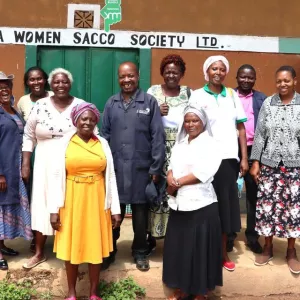Women-led cooperative driving adoption of climate-smart agriculture strategies in Makindu, Makueni County
Since the 1930s, farmers in the lower eastern regions of Machakos and Makueni in Kenya have a history of collective working through Mwethya groups- a name referring to organized farmer groups focusing on soil conservation. Farmers forming modern cooperatives have sustained this group model to work together to achieve their social and economic growth. Kimatwa SACCO is a women-led cooperative

Women-led cooperative driving adoption of climate-smart agriculture strategies in Makindu, Makueni County
Since the 1930s, farmers in the lower eastern regions of Machakos and Makueni in Kenya have a history of collective working through Mwethya groups- a name referring to organized farmer groups focusing on soil conservation. Farmers forming modern cooperatives have sustained this group model to work together to achieve their social and economic growth.
Kimatwa SACCO is a women-led cooperative serving over 700 members. The Society seeks to empower its members financially. Agriculture is one of the pillars through which the members are supported to grow as alluded to by the group chair.
“We offer agricultural loans to our members to engage in agriculture. But with climate change leading to frequent crop failure, some farmers lose their crops and default on the repayment. It is on this basis that we want them to adopt smart ways of farming to be profitable”, noted Theresiah Ngonze, Chairlady, Kimatwa SACCO
Linking with the Accelerating Impacts of CGIAR Climate Research for Africa (AICCRA) project, Kimatwa SACCO embarked on joint learning to scale and promote CSA technologies. AICCRA seeks to scale CSA and climate information services (CIS) so that they reach millions of small-scale farmers in Africa. This helps farmers adopt CSA – making agriculture more productive while adapting to or mitigating the effects of climate change.
The journey started with the sensitization sessions held in August 2023 where over 300 members were trained on aspects of CSA, CIS, financial literacy, and gender. Through a co-design approach, the AICCRA and Kimatwa SACCO adopted a Mother Baby Demo Approach for learning and scaling CSA practices. The approach involves three “levels” – mother trials, baby trials, and farmer experimentation. This trial design serves multiple functions: generating data on the performance of alternative technologies, creating the basis for researcher-farmer dialogue to refine the options being tested, and encouraging farmer experimentation even in the absence of researchers.
“We are dealing with a diverse community. The bundling of technical and social solutions is key to providing options for diverse farmers to choose from as they walk the journey to CSA adoption. The design of the mother-baby Approach enables us to demonstrate options for farmers to choose from”, noted Boaz Waswa, Soil Fertility Expert from Alliance Bioversity International and CIAT.

